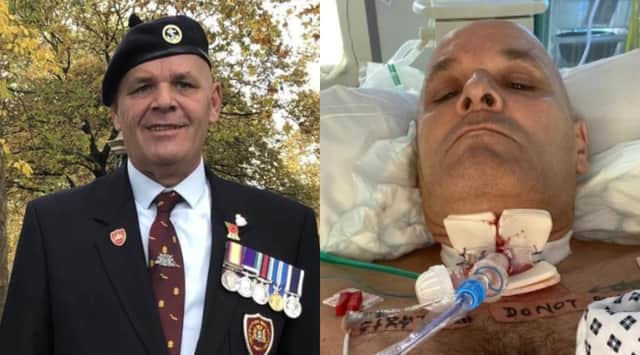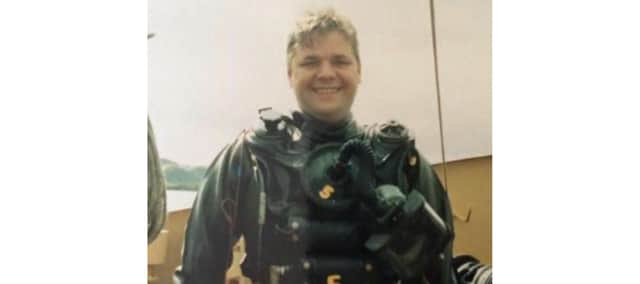Portsmouth man reveals impact of diabetes care failings as medical negligence lawyers secure answers
and live on Freeview channel 276


Glyn Holgate was admitted to Queen Alexandra Hospital in Portsmouth on New Year’s Eve night 2020 with suspected gastroenteritis. He had complained of symptoms including vomiting, shivering and diarrhoea for more than a week.
Medical tests in the previous days had found he had high levels of blood glucose and ketones – a chemical used to break down fats – both warning signs of developing diabetic ketoacidosis (DKA). Once in hospital, medics failed to adequately monitor the 59-year-old’s glucose and ketone levels.
Advertisement
Hide AdAdvertisement
Hide AdGlyn, of Cosham, Portsmouth, developed DKA. It should have been identified on the morning of January 1, 2021, and a DKA management care plan started, health bosses admitted following legal submission by specialist lawyers at Irwin Mitchell. However, the condition wasn’t diagnosed until 10.30pm on January 3 and a DKA care plan started thereafter.
The dad-of three, step-dad-of-two and grandfather-of-one developed pneumonia and breathing difficulties, partly caused by the amount of fluid he was given to treat his condition. He had reduced oxygen levels in his blood and an acute kidney injury on January 4, 2021.
The Royal Navy veteran was transferred to intensive care that afternoon and put on a ventilator, following which his vocal cords were damaged. He spent eight days on a ventilator. After discharge, Glyn continued to suffer severe breathlessness.
Six months later he was diagnosed with vocal cords restriction and a small airway. He continued to suffer from shortness of breath and difficulty with swallowing. Glyn underwent surgery, including a tracheostomy, following which he was told his tracheostomy would be permanent. Sadly, Glyn is no longer able to continue with his job in security as a result of his injuries. The tracheostomy prevents the experienced diver from enjoying his passion for diving.
Advertisement
Hide AdAdvertisement
Hide AdFollowing his ordeal, he instructed expert medical negligence lawyers at Irwin Mitchell to investigate his care and help him access the specialist support he requires.
Glyn, who has type-II diabetes, has now joined his legal team in warning of the dangers of DKA. It comes after Portsmouth Hospitals University NHS Trust, which runs Queen Alexandra Hospital, admitted a breach of duty. The Trust admitted that Glyn’s DKA should have been recognised on the morning of 1 January and DKA care started.
If treatment had been implemented sooner it would have avoided the need for intensive care treatment and Glyn being put on a ventilator and he would have avoided his vocal cord injury, the Trust admitted.
Advertisement
Hide AdAdvertisement
Hide AdAbigail Salter, the specialist medical negligence lawyer at Irwin Mitchell representing Glyn said: “The last few years and coming to terms with the avoidable injuries and the life-changing impact they’ve had has been incredibly difficult for Glyn and his family. DKA is caused where a lack of insulin leads to ketones building up in the blood. It can be life-threatening and needs urgent hospital treatment. Sadly, in Glyn’s case, this didn’t happen.
“While nothing can make up for what he’s been through we’re pleased to have been able to establish the answers Glyn and his family deserve. It’s now vital that lessons are learned to improve patient safety for others. In the meantime, we continue to work with the Trust to secure Glyn a settlement which will fund the life-long support he now requires because of his injuries.”


Glyn, who lives with his long term partner Jill Saddington, 58, said: “It’s difficult not to think how my life has changed because of the ordeal I’ve gone through. I’d learned how to regulate and live with my diabetes and knew the warning signs. When I felt poorly it was horrible. I was in a bad way and felt I needed help.
“When I went to hospital I hoped I would get the treatment I needed but despite warning signs it felt like nobody was taking my situation seriously. Life has totally changed for me now. I still suffer with breathlessness and am conscious about my tracheostomy. Things people take for granted like getting a shower or in the bath are a lot more difficult. I need to take real care to ensure water doesn’t get into my tube.
Advertisement
Hide AdAdvertisement
Hide Ad“I can’t thank my family enough for the support they’ve given me. They’ve been my rock; however, I still get upset at what I’ve had to go through. I know nothing will change what happened to me, but I just hope that by speaking out I can prevent it happening to someone else.”
A spokesperson from Portsmouth Hospitals University NHS Trust said: “Our teams work hard every day to provide safe, compassionate care to the communities we serve. However, we know we don’t always get this right and apologise that not every patient has the positive experience we want to provide. When we haven’t met the expectations of our patients and their families, we take every action to learn and to improve.”
Comment Guidelines
National World encourages reader discussion on our stories. User feedback, insights and back-and-forth exchanges add a rich layer of context to reporting. Please review our Community Guidelines before commenting.